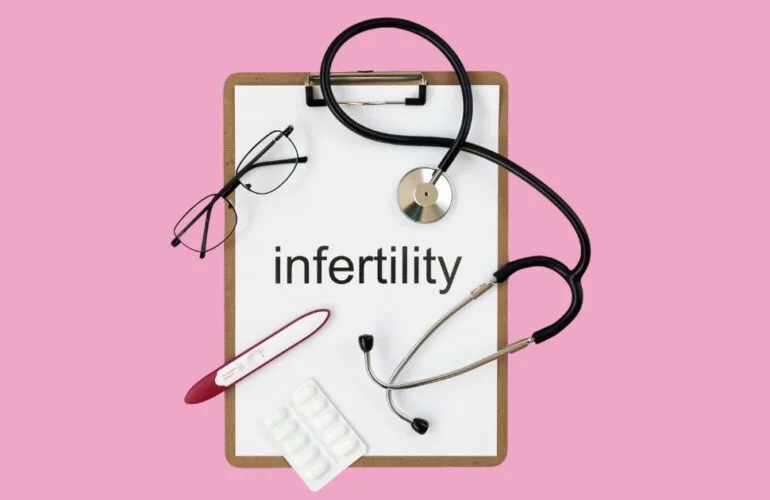People and couples who want to start or grow their families often find fertility to be a very personal and sensitive subject. A lot of people are looking for natural ways to boost fertility, even though modern medicine has a lot of options. This method is all about using diet, lifestyle, and holistic habits that have been around for a long time to support reproductive health. You can build a strong base for getting pregnant and staying healthy in the long term by learning about the importance of nutrition, stress management, and daily routines.
This article is a thorough, evidence-based guide to boosting natural fertility. It looks at foods, lifestyle changes, and tried-and-true methods that have worked for generations.
Learning About Fertility and the Problems It Can Cause

Fertility is the ability to get pregnant and carry a pregnancy to term. For most couples, their ability to have children is affected by a mix of biological, lifestyle, and environmental factors. The World Health Organization says that about 1 in 6 couples around the world are infertile. Age, genetics, and medical conditions are all important, but many lifestyle choices have a big impact on reproductive health.
The good news is that you can improve your fertility naturally by focusing on basic health habits. Making small changes to your diet, daily routine, and how you deal with stress can have a big effect on both men’s and women’s reproductive systems.
How Lifestyle Affects Fertility
One of the things that can have the biggest effect on fertility is how you live your life. Decisions about sleep, nutrition, exercise, and stress management can affect hormone levels, the health of eggs and sperm, and overall reproductive health. These changes are long-term strategies that are based on science and real-world results, unlike quick fixes or fads.
Key Lifestyle Factors That Affect Fertility
- Nutrition: Getting enough micronutrients helps with hormone balance, egg quality, and sperm count.
- Exercise: Moving around improves blood flow and lowers inflammation.
- Sleep quality: Getting enough sleep helps keep hormones in balance.
- Managing stress: Long-term stress can stop ovulation and sperm production.
- Exposure to the environment: Lessening toxins can help keep reproductive health safe.
Couples can increase their chances of getting pregnant naturally by working on these things.
Food That Naturally Boosts Fertility
Food is one of the best ways to naturally boost fertility. A healthy diet full of whole, nutrient-dense foods is the key to good reproductive health. Let’s look at the best food choices for health.
1. Put Whole, Unprocessed Foods First

Whole foods have the vitamins, minerals, and antioxidants that are good for reproductive health. Eating a lot of fresh fruits, vegetables, whole grains, nuts, seeds, and lean proteins is good for both eggs and sperm. Not eating too many processed foods can help lower inflammation and balance hormones.
2. Nutrients That Help Fertility
There is a consistent link between certain nutrients and better fertility outcomes:
- Folate (Vitamin B9): Important for healthy egg growth and stopping birth defects. Lentils, asparagus, leafy greens, and citrus fruits all have it.
- Zinc: Important for making sperm and developing eggs. Pumpkin seeds, chickpeas, nuts, and whole grains are some examples of sources.

- Iron: Helps with ovulation and gives you energy. Lentils, spinach, and lean red meat all have it.
- Omega-3 fatty acids: Help keep hormones in check and increase blood flow to the reproductive organs. Salmon, chia seeds, and walnuts are all good sources.
- Vitamin D: Helps balance hormones and keep the reproductive system healthy. You can get it from the sun, fortified foods, and fatty fish.
- Antioxidants (Vitamin C, E, selenium): Protect eggs and sperm from oxidative stress. Berries, nuts, and green vegetables all have it.

3. Healthy Fats Instead of Trans Fats
Polyunsaturated and monounsaturated fats help balance hormones and make insulin work better. On the other hand, trans fats (found in fried and processed foods) can mess up ovulation and sperm health. Avocados, olive oil, nuts, and seeds are all great sources of fat that are good for fertility.
4. Getting the Right Amount of Protein
A diet that boosts fertility should include plant-based proteins like beans, lentils, and quinoa, as well as lean animal proteins like chicken, fish, and eggs. Plant proteins have been linked to better reproductive outcomes when they replace red or processed meats.
5. Cut Down on Sugar and Refined Carbs
Eating a lot of sugar can make your body resistant to insulin, which can affect ovulation and hormone balance. Choosing whole grains and carbs that are high in fiber helps keep blood sugar levels stable, which is good for fertility.
6. Staying Hydrated Is Important
Water helps the body make cervical mucus, which is necessary for moving sperm. Staying hydrated also helps your body get rid of toxins and absorb nutrients. Herbal teas like ginger or peppermint (in moderation) can be good for you, but you should stay away from drinks with a lot of caffeine and sugar.
Things You Can Do to Naturally Boost Your Fertility

Along with diet, the way you live your life is very important for your reproductive health. For conception to happen, the best environment is one that lasts for a long time.
1. Keep Your Weight in Check
Being either too thin or too heavy can throw off hormone levels and stop ovulation. Eating a balanced diet and getting regular exercise can help both men and women have the best chance of getting pregnant by keeping their body mass index (BMI) in a healthy range.
2. Get Some Exercise
Exercise improves blood flow, lowers stress, and balances hormones. But women who exercise too much, especially when they do intense endurance training, may not ovulate and men may have fewer sperm. Walking, yoga, swimming, and strength training are all moderate activities that work best.
3. Make Sure You Get Good Sleep
Sleep is important for keeping hormones in check. Poor sleep habits can mess with hormones that are important for reproduction, like testosterone and progesterone. Adults should try to get 7 to 9 hours of good sleep every night, with regular sleep-wake cycles.
4. Handle Stress Well
Chronic stress can mess up the hypothalamic-pituitary-gonadal axis, which can stop ovulation and sperm production.
Some ways to reduce stress are:
- Meditation for mindfulness
- Tai chi or yoga
- Writing in a journal
- Walks in nature
- Exercises for deep breathing
These age-old methods lower cortisol levels and bring the reproductive system back into balance.
5. Get Rid of Toxins in the Environment
Pesticides, heavy metals, and endocrine-disrupting chemicals (which are found in plastics, cleaning products, and cosmetics) can all hurt fertility.
Some useful steps are:
- When you can, choose organic fruits and vegetables.
- Instead of plastic, use glass or stainless steel containers.
- Choosing to use natural cleaning products.
- Avoiding chemicals in personal care products that you don’t need to be around.
6. Don’t Smoke, Drink Too Much Alcohol, or Drink Too Much Caffeine
Smoking hurts the DNA of eggs and sperm, and drinking alcohol changes hormone levels and how well you can get pregnant. Too much caffeine can also make it harder to get pregnant. Cutting back on or getting rid of these things is a great way to naturally boost your fertility.
Women’s Natural Fertility

Ovulation, egg quality, and hormonal balance all play a role in a woman’s ability to get pregnant. Helping these things happen naturally can greatly increase the chances of getting pregnant.
- Cycle awareness: Using basal body temperature or ovulation predictor kits to track ovulation can help you find fertile windows.
- Hormone balance: Nutrition, stress management, and sleep are all important for keeping estrogen and progesterone levels in check.
- Health of the uterus: Good blood flow, which can be helped by exercise and drinking enough water, gets the uterus ready for implantation.
Men’s Natural Fertility
Male fertility is just as important for getting pregnant. Your lifestyle and the nutrients you eat can affect the health of your sperm. Some important things to pay attention to are:
- Antioxidants: Keep sperm DNA safe from damage caused by free radicals.
- Zinc and selenium: Can help with sperm count, movement, and shape.
- A healthy weight: Lowers the risk of having low testosterone and bad sperm quality.
- Temperature control: Staying away from hot tubs, tight underwear, and using a laptop on your lap for long periods of time can help keep sperm production healthy.
Long-Term Health and Fertility

Fertility health isn’t just about getting pregnant; it’s also about having good reproductive health for a long time. People can help keep their hormones in balance, their menstrual health, and their overall health well into old age by keeping up healthy habits.
- Natural fertility practices may also lower the risk of polycystic ovary syndrome (PCOS) and endometriosis in women.
- For men, they may help keep testosterone levels up and lower the chance of sperm quality going down with age.
Advice from Experts on How to Naturally Support Fertility
Healthcare professionals stress that making long-term changes to your diet and lifestyle is the best way to naturally boost your fertility. Some suggestions that keep coming up are:
- Talk to a doctor: Make sure that any underlying health problems are taken care of before making big changes.
- Start early: The sooner you start practicing healthy habits, the better they will be for your reproductive health.
- Think about the whole body: Not just the reproductive system affects fertility.
Putting It All Together: A Daily Routine That Helps Fertility

Here’s what a balanced day might look like to make these tips more useful:
- Morning: Start your day with a healthy breakfast that includes whole grains, fruit, and protein. Do five minutes of deep breathing or meditation.
- Midday: Eat a lunch with leafy greens, lean protein, and healthy fats at noon. Go for a short walk to get your blood flowing and relieve stress.
- Afternoon: Stay hydrated and pick a snack like yogurt or nuts. After noon, cut back on caffeine.
- Evening: Dinner time: Have a healthy meal with fish high in omega-3s, legumes, or colorful vegetables. Do some gentle stretching or yoga to relax.
- Night: Stick to a regular bedtime routine to get good sleep. Don’t use screens before bed to get better sleep.
Last Thoughts
Fertility is a fragile equilibrium of biological, lifestyle, and environmental factors. While medical assistance is occasionally essential, adopting natural methods to enhance fertility establishes a lasting basis for reproductive health. Individuals and couples can make the best environment for conception by eating whole foods, getting enough sleep, reducing stress, and avoiding toxins.
The methods in this guide are not just fads; they are tried-and-true methods that will work for many years to come. These habits give you the power to take charge of your health in the most natural way possible, whether you are just starting your journey to get pregnant or want to keep your reproductive health in good shape for a long time.
Read Also:













